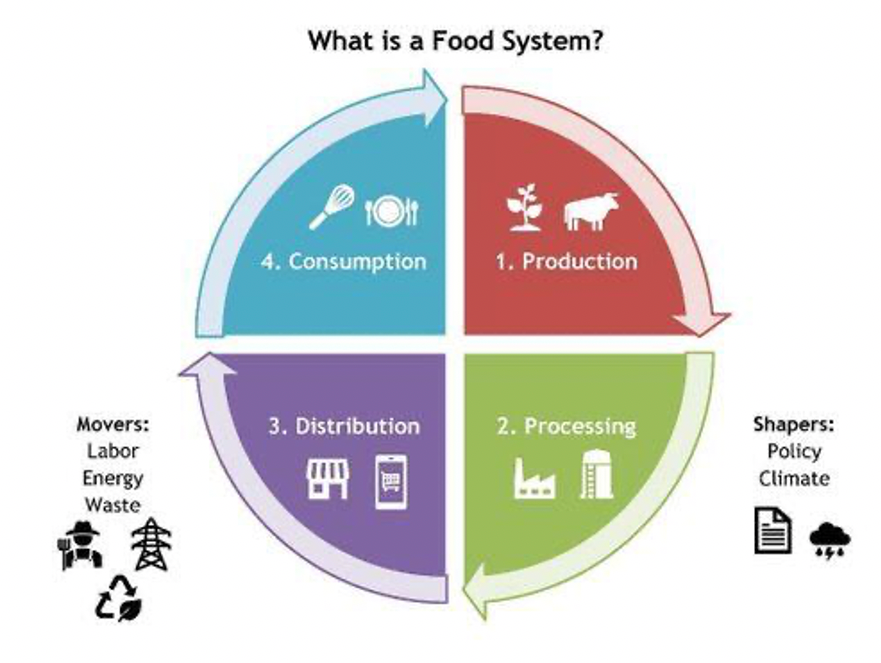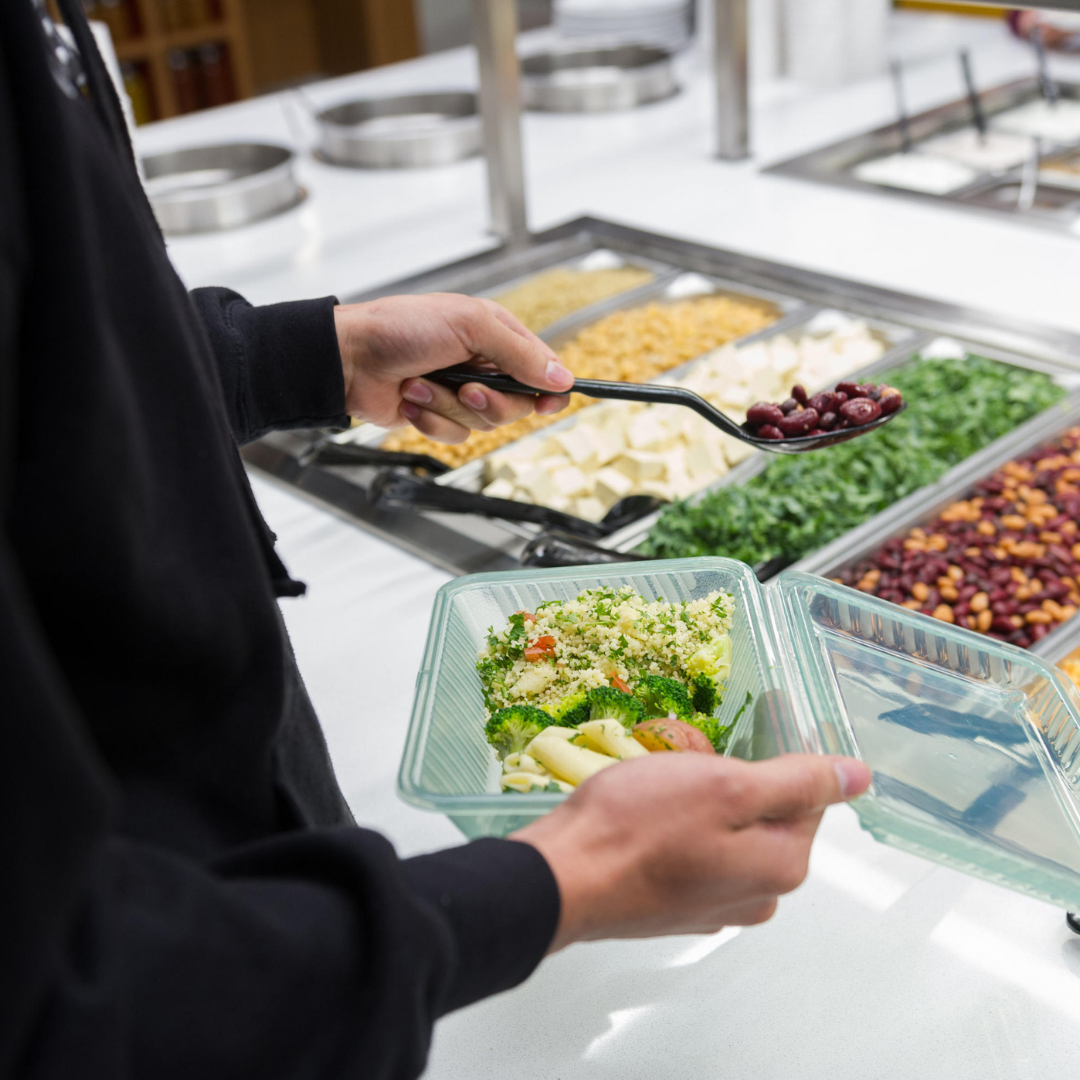Do you enjoy listening to podcasts rather than reading blog posts? Check out Episode 01 of the WAT's Sustainable? Podcast, where we explore food systems sustainability!
Happy May, everyone! With gardens in full bloom and farmers' markets exploding with fresh, local produce, May is a perfect time to explore how to incorporate sustainability into your food choices. Since we all consume food every day, multiple times a day, the foods we eat create opportunities every day to promote sustainability!
What is a "sustainable" food system?

According to the Food and Agriculture Organization of the United Nations (FAO), a food system includes all of the processes and people that going into producing, transporting, consuming and disposing of food products. When you think about it, just about everyone and everything is somehow connected to food.
The FAO defines a sustainable food system as one that ensures food security and nutrition for everyone, everywhere, in a manner that supports economic, social, and environmental wellbeing for current and future generations. This means ensuring that people have enough food, and quality food, at all times.
Importantly, we must recognize how much nuance exists within a "sustainable" food system. For instance, how sustainable is a food product with compostable packaging if it supports deforestation, dangerous labour conditions or produces a lot of emissions in its supply chain? There is no ‘one’ indicator that accurately captures food system sustainability. There will inevitably be trade-offs. This means we need to pursue sustainability in all dimensions of the food system to truly call it "sustainable." As you can probably imagine, that is going to be a long, complex process, one that will require collaboration, cooperation, and action from all stakeholders.
The current context

Globally, food systems possess many unsustainable attributes. For instance, rapid population growth means there are more mouths to feed. Shifting dietary preferences towards more meat consumption and "westernized" diets means more people are demanding cheap, processed foods, leading to increased health complications at unprecedented rates. Rising food prices are making it even harder for low-income households to afford fresh, healthy alternatives, contributing to this vicious cycle.
There are also significant inequities between overabundance of food, food waste, and food insecurity; in Canada, 60 percent of the food produced nationally is wasted, while 820 million people go hungry every year. The food industry is also a source of unfair wages and labour conditions in many parts of the world. From an environmental standpoint, unsustainability in food systems is leading to numerous negative impacts: biodiversity loss from monocropping and land use change, carbon emissions from animal agriculture, rapid water consumption and pollution, overharvesting, soil depletion - the list goes on.
These problems stem from broader, cross-sectoral issues such as inequities, poverty, corruption, consumerism and so on - so just approaching them from a food systems lens will not solve the root problems. We need to approach them from a broader systems-oriented perspective to even begin addressing them.
What is being done to promote food systems sustainability

Achieving food systems sustainability has become a focus of international movements from local to global scales. Several of the United Nations Sustainable Development Goals (SDGs) directly connect to food systems, including SDG 1 - No Poverty, SDG 2 - Zero Hunger, SDG 3 - Good Health and Well-Being and more; it also indirectly connects to environmentally-focused SDGs such as SDG 14 and 15 - Life Below Water and Life on Land, respectively.
Since food systems sustainability is so multi-faceted, making sustainable food choices can take many forms. For example, community gardens can provide fresh, affordable food, fresh air and connection to nature, and social connection with community members, fostering a holistic sustainable practice. Similarly, purchasing foods with eco-labels like Fair Trade and Organic not only promote environmental wellbeing, but also support fair working conditions.
What you can do to promote food systems sustainability
Addressing challenges within the food system can seem overwhelming with how complex and multi-faceted their issues are. However, there are things you can do in your personal life to take action that contributes to collective change. In addition to engaging with larger groups taking action - including community gardens, student-led virtual initiatives and more - you can incorporate sustainability into your food choices every day. To do so, you can ask yourself a few questions while shopping at the grocery store:
- When was it grown? Purchase food items that are in-season by using seasonal availability guides, such as FoodLand Ontario's Seasonal Availability Guide. Not only can you use the guide when purchasing foods, but it can help you plan your own garden! Nothing is fresher than picking your own produce.
- Where was it grown? Opt for locally-produced items. A 2005 study by the City of Waterloo found that the average plate of food in Waterloo travels 4,500 kilometres! Locally grown foods typically mean those grown within the province or within 400 kilometres of where they are being consumed. Check out local farmers markets, CSAs , or growing your own food (the best way to reduce your food mileage, since it's coming straight from your garden!).
- Why are you eating it? Are there items you can swap for more sustainable alternatives? For instance, could you swap meat out for a plant-based protein in one dish, or look for options with sustainable certifications?
- How was it made? Look for eco-labels that demonstrate how the food product is meeting specific sustainability criteria in its production, such as Certified Organic or Fair Trade. Use the Eco Label Index to learn more about eco-labels. In addition, opt for food items with little to no packaging, or ones that have recyclable/compostable packaging if needed. This might mean making more food at home versus buying items to-go, since you can store food in reusable containers. It may also mean growing your own produce!
Summary and additional resources
In summary, food systems are complex, and sustainable food systems are even more complex – but there are many ways you can take action in your daily life. Keep in mind we need action in all aspects of these systems to foster true sustainability, so our collective efforts in these different avenues are crucial for making an impact.
To get you started on your sustainable food systems journey, here are some resources to inspire you and to learn more:
- Sustainability Office's Food web page
- How to Cook With Food Scraps [video, CC]
- Canada’s New Food Guide
- Eco Label Index
- Cookspiration (app for recipe inspiration)
To learn more and get involved in local food systems groups in Waterloo Region, check out these organizations and resources:
- Sustainable Growing at Home Mini-Series, created by University of Waterloo staff (including our Office's staff!) [video, CC]
- Community Fridge KW
- Food System Roundtable of Waterloo Region
- Zero Waste Bulk and Full Circle Foods for zero-waste, locally-produced food items, or Zerocery which delivers to Guelph, Kitchener-Waterloo, Cambridge and Hamilton
- Instagram page for Nicole Pin @enjoyyourfoodrd, the Food Services’ Registered Dietitian
- Region of Waterloo Community Gardens